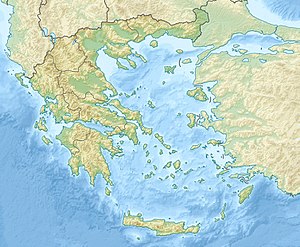Battle of Thermopylae
pronunciation
Battle of Thermopylae, (480 BCE), battle in central Greece at the mountain pass of Thermopylae during the Persian Wars. The Greek forces, mostly Spartan, were led by Leonidas. After three days of holding their own against the Persian king Xerxes I and his vast southward-advancing army, the Greeks were betrayed, and the Persians were able to outflank them. Sending the main army in retreat, Leonidas and a small contingent remained behind to resist the advance and were defeated.
Description
The Battle of Thermopylae’s political origins can be traced back to Xerxes’ predecessor, Darius I (the Great), who sent heralds to Greek cities in 491 BCE in the hopes of persuading them to accept Persian authority. This offended the proud Greeks greatly; the Athenians went so far as to toss the Persian heralds into a pit, while the Spartans followed suit and tossed them into a well. In 480 BCE Xerxes invaded Greece as a continuation of Darius’s original plan. He began the same way his predecessor had: he sent heralds to Greek cities—but he skipped over Athens and Sparta because of their previous responses. Many Greek city-states either joined Xerxes or remained neutral, while Athens and Sparta led the resistance with a number of other city-states behind them. Before invading, Xerxes implored the Spartan king Leonidas to surrender his arms. Leonidas famously replied, “Come and take them” (“Molon labe”). Xerxes intended to do just that and thus moved toward Thermopylae.
Background
Themistocles was in command of the Greek Navy at Artemisium when he received news that the Persians had taken the pass at Thermopylae. Since the Greek strategy required both Thermopylae and Artemisium to be held, given their losses, it was decided to withdraw to Salamis. The Persians overran Boeotia and then captured the evacuated city of Athens. The Greek fleet—seeking a decisive victory over the Persian armada—attacked and defeated the invaders at the Battle of Salamis in late 480 BC. Wary of being trapped in Europe, Xerxes withdrew with much of his army to Asia (losing most to starvation and disease), leaving Mardonius to attempt to complete the conquest of Greece. However, the following year saw a Greek army decisively defeat the Persians at the Battle of Plataea, thereby ending the Persian invasion.
Both ancient and modern writers have used the Battle of Thermopylae as an example of the power of a patriotic army defending its native soil. The performance of the defenders is also used as an example of the advantages of training, equipment, and good use of terrain as force multipliers and has become a symbol of courage against overwhelming odds.
Battle of Thermopylae Paintings and Images


